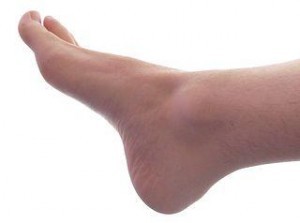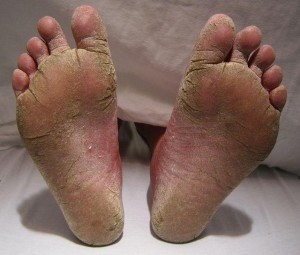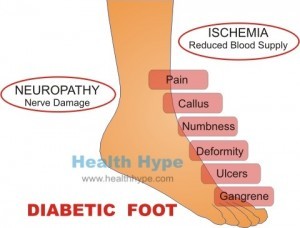Burning Toes – Causes (Injury, Diseases, Drugs, Deficiencies)
A burning sensation can often be confusing. There is no obvious source of heat to trigger the sensation and it is not overt pain. Sometimes it is taken less seriously than pain but a burning sensation may be occurring for some of the same reasons as pain would occur. There could be underlying disease or damage to the tissues of the toes and without prompt medical attention it can lead to serious complications. Burning in the toes may occur for many of the same reasons as a burning sensation in the feet or entire lower leg.
It is important that the exact cause be diagnosed and treated promptly to prevent the situation from worsening. There are a host of possible causes by the more common causes of burning toes and feet have been discussed below. Also refer to 5 common reasons for burning feet.
Injury
This is usually the most common cause of burning in the toes. An obvious injury like stubbing your toe may lead to pain and burning for a while thereafter, but sometimes the injury is not as acute or as easy to spot. Our feet are in contact with our environment whenever we walk, stand or sit and often the potential causes of injury are not easily spotted because it is so low down from the normal line of vision. An injury will usually also present with other symptoms of inflammation like redness, swelling and heat over the most affected area.
Other causes of a toe injury includes:
- Exposure to cold
- Contact with toxic chemicals
- Insect sting or bite
- Poorly fitting shoes
- Burns (coals, fire, cigarettes, electric burns)
- Tiptoeing for long hours
Some of these causes may not cause immediate burning. Poorly fitting shoes may seem tolerable for long hours but once removed a burning sensation arises. Diabetics with nerve damage also do not feel injuries immediately until the initial tissue damage worsens significantly.
Infections
A number of different infections of the skin and deeper tissue of the toes can cause a burning sensation.
Fungal
Among the more commonly known is athlete’s foot (tinea pedis) which is superficial fungal infection of the skin on the toes. It tends to occur more frequently in between the toes (web of the toes). Read more on toe fungus treatment.
Picture of athlete’s foot on both feet
Bacterial
A bacterial infection of the skin and deeper tissue is more likely to occur when there is a break in the skin, poor wound healing, inadequate treatment and impaired immune defenses. Bacterial infections of the toes are common among diabetics in particular.
Viral
Although a number of viruses can affect the skin and deeper tissue, the more likely cause of burning toes is shingles. This is caused by reactivation of the chickenpox virus which is latent in the nerve roots. HIV (human immunodeficiency virus) infection is another major cause.
Nerve Disease
A number of nerve-related conditions can cause a burning sensation in the feet. These are some of the more common causes of burning toes and feet which is persistent or recurrent, without any rash or obvious injury. Nerve problems are collectively referred to as neuropathy and when it affects nerves outside of the brain and spinal cord then it is known as peripheral neuropathy.
There are a number of reasons why a nerve may become damaged or diseased. Two conditions that are worth noting in this regard includes:
- Diabetic neuropathy which is nerve damage associated with long term and poorly controlled diabetes. Burning of the feet is a common symptom which eventually progresses to pain.
- Pinched nerve is where the root of the nerve is compressed as it leaves the spinal cord. This is another common cause of abnormal sensations like burning of the feet.
In these instances the nerve that carries sensation signals from the feet to the brain is irritated, damaged or diseased. As a result false sensations are generated and in this case it is a burning sensation. However, there could still be localized problems in the tissue of the feet.
A lesser known but significant cause of neuropathic burning sensation in the feet is alcohol abuse. The nerves are damaged by the long term and excessive consumption of alcohol and symptoms like a burning pain may be present.
Circulation Problems
Blood circulation problems are another common cause of chronic burning in the feet. There are two types of problems that could be responsible:
- Arterial problems where the flow of oxygen-rich blood through the arteries is restricted.
- Venous problems where flow of oxygen-deficient blood back to the heart through veins in restricted.
Common arterial problems are broadly termed as peripheral arterial disease. It is largely due to narrowing of the leg arteries by the buildup of fatty plaques in the walls (atherosclerosis). One of the main venous problems is deep vein thrombosis (DVT) where a blood clot in the deep veins of the leg hampers blood flow returning to the heart. Varicose veins is another venous problem in the legs.
Vasculitis is inflammation of the blood vessels, either the arteries or veins. Here the burning sensation emanates from the blood vessel itself. Burning feet is a common complaint in menopause. It is believed to be due to the alterations in blood flow to the feet as a result of the hormone changes that occur in menopause. However, the exact mechanism for burning feet in menopause is not exactly known.
Swelling of the legs which may occur due to disturbances in leg circulation or it can occur for other reasons and then affect the movement of blood through the leg. For example, kidney problems where there is fluid retention can lead to leg swelling. Hypertension (high blood pressure) can cause swelling of the legs.
Joint Diseases
The joints in the toes may be affected by several diseases which causes a burning sensation, sometimes even when no other symptoms are apparent. The main such conditions are gouty arthritis, osteoarthritis and rheumatoid arthritis.
- Gout is a condition marked by high levels of uric acid in the bloodstream. It tends to cause joint pain and swelling and the big toes are the most commonly affected site. An attack of gouty arthritis can present with a burning pain the toes.
- Osteoarthritis is caused by the wearing down of cartilage that caps the ends of the bones in a joint. Stiffness and pain are the main symptoms. This pain can at times be described as a burning in the joints.
- Rheumatoid arthritis is an autoimmune condition where the immune system attacks the joint lining. Stiffness, pain and swelling are present and usually the joints on both feet will be affected simultaneously. This may also be a burning pain in nature.
Drugs
A burning sensation in the leg can be a side effect of several drugs including antiretrovirals (ARVs), chemotherapy and metformin, among other drugs. It is important to note that some of the conditions that are treated by these drugs, like HIV infection (treated with ARVs) and diabetes (treated with metformin), may be a cause of the burning sensation in the toes and feet. Stopping the drug prematurely can therefore worsen these conditions and exacerbate the burning sensation.
* Always consult with a doctor before stopping any prescription medication. Your new symptoms are not necessarily due to the drugs you are taking.
Toxins and Deficiencies
Certain nutrient deficiencies can cause a burning sensation in the feet. The most notable of these are vitamin B12 and folic acid deficiencies. However, other B-vitamins may also play a role, such as vitamin B5 (pantothenic acid). Most deficiencies can be corrected with a balanced diet and supplementation where necessary.
Sometimes excessive intake of vitamins like a vitamin B6 overdose may in fact cause a burning sensation in the feet. A number of toxins can cause burning toes and feet. Most notably are the heavy metals like arsenic, lead and mercury. Many of these metals also cause muscle weakening in the area.
Other
- Hypothyroidism
- Systemic lupus erythematosus (SLE)
- Sarcoidosis
- Multiple sclerosis
- Guillian-Barre syndrome







